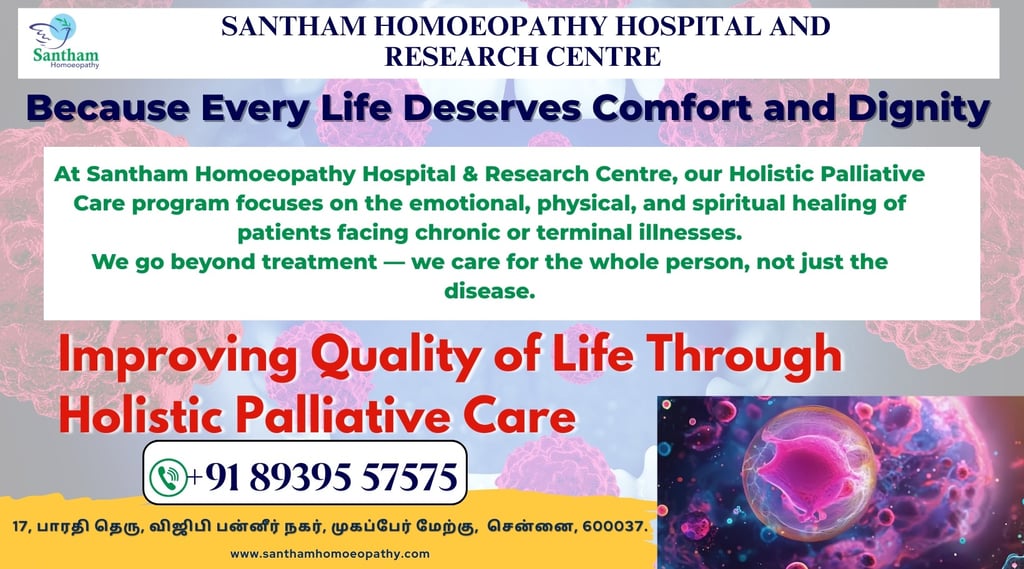Improving Quality of Life Through Holistic Palliative Care
10/28/20254 min read


Understanding Holistic Palliative Care
Holistic palliative care is a comprehensive approach designed to enhance the quality of life for individuals dealing with terminal or chronic conditions. Unlike traditional curative treatments, which primarily target the disease itself, holistic palliative care emphasizes the overall well-being of the patient. This method acknowledges that individuals are not just a set of symptoms or illnesses, but rather whole beings with emotional, physical, and spiritual needs that require attention and support.
The primary purpose of holistic palliative care is to alleviate suffering while promoting comfort and dignity throughout the course of illness. This approach encompasses not only pain management but also addresses psychological, social, and spiritual concerns. Practitioners of holistic palliative care work collaboratively with patients, families, and other health care providers to create a tailored care plan that respects the individual’s values and preferences. It ensures that care is centered on the person's unique experiences and challenges, fostering a supportive environment that is conducive to healing and comfort.
One of the fundamental principles of palliative care is its integrated approach to treatment, which distinguishes it from curative measures. While curative treatments inevitably focus on eradicating disease, holistic palliative care aims to optimize the quality of life for patients, even when disease progression is inevitable. This becomes particularly crucial in the management of complex health issues at institutions like Santham Homeopathy Hospital & Research Centre, where patients often face multifaceted challenges that require more than standard medical interventions.
In essence, holistic palliative care evaluates the intricate web of a patient's medical, emotional, and spiritual status, fostering an environment where dignity, comfort, and quality of life remain paramount throughout their journey.
The Role of Emotional Healing
Emotional healing plays a pivotal role in holistic palliative care, significantly impacting the quality of life for patients and their families. Individuals facing serious illnesses often contend with various emotional challenges, including anxiety, depression, and grief. These feelings can arise from the uncertainty of the illness, concerns about the future, and the implications of potential treatment outcomes. Moreover, families may experience their own emotional turmoil as they support their loved ones and cope with perceived losses. Hence, addressing these emotional aspects is essential for comprehensive palliative care.
At Santham Homeopathy Hospital, a range of therapeutic techniques are implemented to facilitate emotional healing. Counseling is one of the primary methods, where trained professionals engage with patients and their families, offering a safe space to express thoughts and feelings. This confidential dialogue allows for the exploration of fears and concerns, aiding in the development of coping strategies. Additionally, support groups are encouraged to foster connections among individuals experiencing similar circumstances, thereby reducing feelings of isolation and enabling participants to share personal experiences and mutual support.
Holistic therapies also play a vital role in promoting emotional well-being. Techniques such as mindfulness, art therapy, and guided imagery provide patients with tools to address anxiety and enhance emotional resilience. These therapies nurture the mind-body connection, allowing patients to process their experiences more effectively. Complementary practices such as yoga and meditation can further alleviate stress and cultivate a sense of peace. By integrating these approaches, the holistic model of palliative care empowers patients to navigate their emotional challenges, promoting overall comfort and quality of life.
Physical Healing and Pain Management
Palliative care is predominantly focused on alleviating suffering and improving the quality of life for patients facing serious health challenges. Effective pain management is a critical component of this approach, utilizing various strategies to ensure patients experience comfort and stability. At the core of these strategies is a collaborative healthcare team that includes physicians, nurses, therapists, and alternative care practitioners who work together to tailor an individualized pain management plan.
Medication management plays a vital role in addressing physical discomfort. Opioids and analgesics are frequently prescribed to control moderate to severe pain. However, the goal is to achieve an optimal balance between effective pain relief and minimizing side effects. In addition to traditional pharmacological treatments, non-pharmacological approaches have gained prominence in managing pain. Alternative therapies, including homeopathy, acupuncture, and physical therapy, can complement conventional methods, offering patients additional avenues for symptom relief.
Furthermore, lifestyle modifications are integral to enhancing physical well-being. Encouraging regular physical activity, balanced nutrition, and hydration can bolster overall health and wellness. Engaging in stress-reducing practices, such as yoga or mindfulness meditation, can significantly benefit emotional and physical states, reducing the perception of pain. The healthcare team at Santham Homeopathy Hospital recognizes the importance of holistic wellness by advocating for a comprehensive approach that encompasses both medical and alternative treatments.
Overall, the integration of medication, alternative therapies, and lifestyle adjustments within a palliative care framework fosters a holistic healing environment. This collective effort aims to provide patients with effective pain management solutions while enhancing their physical well-being, ultimately allowing them to experience a better quality of life during their treatment journey.
Spiritual Well-Being in Palliative Care
Spiritual well-being plays a pivotal role in holistic palliative care, as it addresses the profound personal needs that transcend physical health. Individuals facing serious illness often grapple with existential questions regarding their life purpose, the nature of suffering, and the inevitability of death. By recognizing and nurturing these spiritual aspects, healthcare providers can significantly enhance the overall quality of life for patients. This comprehensive approach goes beyond merely alleviating physical symptoms; it seeks to foster a sense of peace and fulfillment during challenging times.
At Santham Homeopathy Hospital, the emphasis on spiritual healing is woven into the fabric of its holistic care practice. One of the core methods employed is mindfulness, which encourages patients to remain present and engaged in the moment. This practice not only helps to reduce anxiety but also cultivates a deeper connection to one’s self, enabling patients to explore their thoughts and emotions without judgment. Additionally, meditation serves as a powerful tool, allowing individuals to find solace and serenity amidst their turmoil, further promoting spiritual well-being.
Creating a supportive environment that allows for personal reflection is crucial in this context. Santham Homeopathy Hospital provides spaces where patients can connect with their loved ones, share experiences, and reflect on their lives. These encounters foster deep emotional connections, which are integral to spiritual health. Furthermore, integrating spiritual care into health assessments ensures that patients' spiritual needs, desires, and beliefs are respected and prioritized. By cultivating a nurturing atmosphere in palliative care that honors the whole person, healthcare professionals at Santham Homeopathy Hospital effectively enhance the spiritual dimension of care, ultimately guiding patients toward a more peaceful and fulfilling end-of-life journey.
